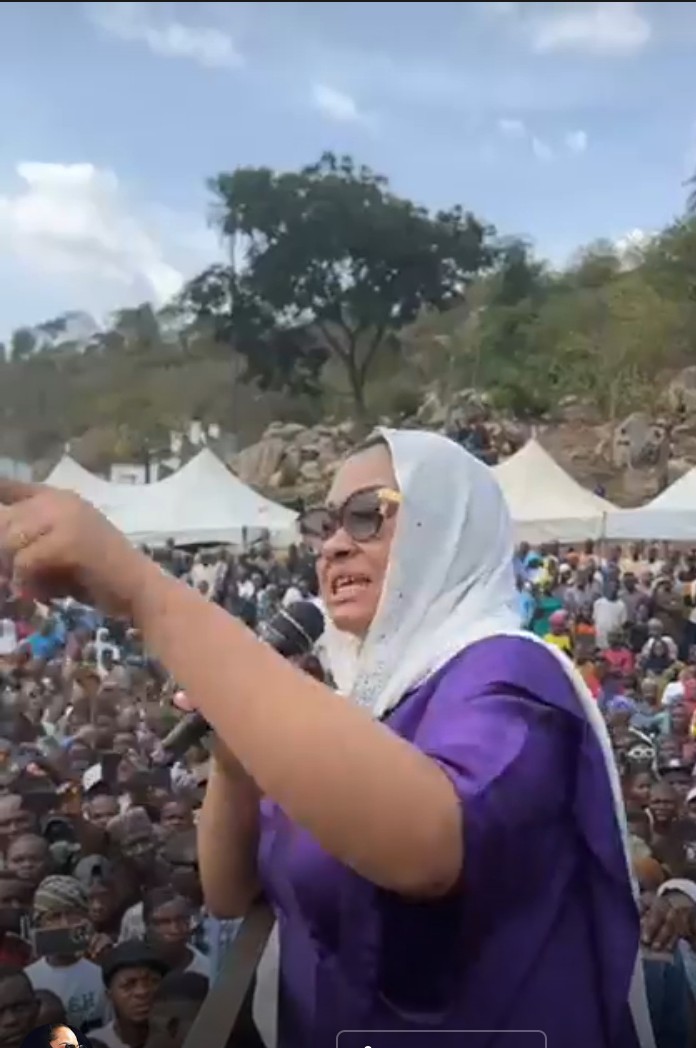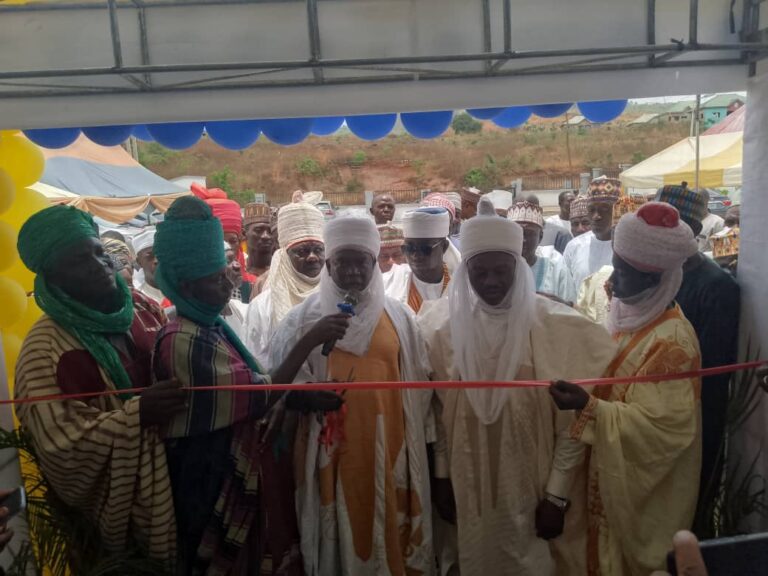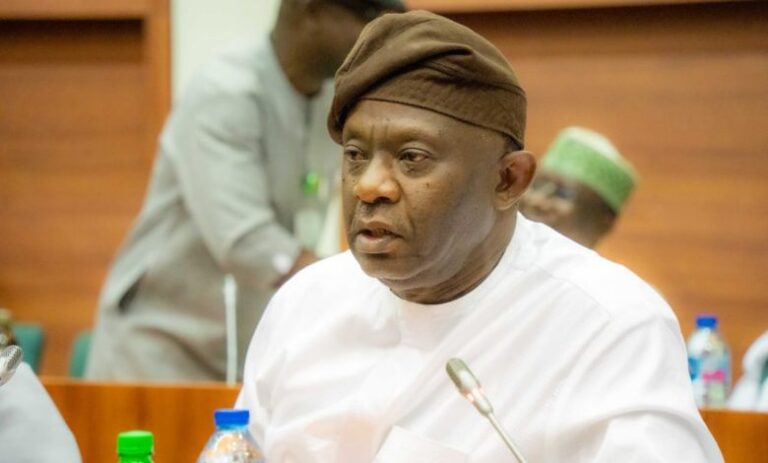Warning: Attempt to read property "post_excerpt" on null in /home/kogiflam/public_html/wp-content/themes/morenews/single.php on line 55


kogiflame.com
By Thomos Moses.
The recent ‘impasse’ between the Executive and the Judiciary took another dimension following governor Yahaya Bello’s appeal to the state House of Assembly to probe into the activities of the state judiciary to unravelled the reasons for their refusal to participate in the just concluded Table Payment organised by the current administration to check the continuous rise in the wage bill of the state workers despite the rigourous staff screening that lasted almost three years.
Apparently, it is expected that after the workers screening that resulted in the removal of ghosts workers, unintended beneficiaries, certificate forgers among other unpardonable offences discovered and expunged from the payroll of the state, keen watchers of event in the state expecteded that the wage bill will depleted by at least 40 percent going by the thousands of illegal workers declared by the state government. But to the surprise of the people , the monthly worker salaries grow progressively from the N2.6 billion inherited by the present administration to over N3.2 billion
Worried by this ugly situation, Governor Bello instituted a Pay Parade otherwise known as Table Payment in the month of November, 2018 to check the mysterious rise in the salaries.
The Governor however instructed all the civil servants in the state to participate in the exercise including the judiciary that has been excluded from any forms of staff screening organised by the previous administrations in the state as a result of financial authonomy enjoyed by the arm of government.
It is worthy to note that Section 121(3) (b) of the Constitution of the Federal Republic of Nigeria 1999 (as amended) provides “Any amount standing to the credit of the judiciary in the Consolidated revenue fund of the state shall be paid directly to the said bodies respectively in the case of judiciary, such amount shall be paid directly to the heads of Courts
concerned.
“The financial autonomy of the States Judiciaries is sine qua non to the effective and efficient administration of justice in the states of the Federation”
Based on this, the Kogi State Judiciary since 1999 had Judicial Service Commission that over sees the affairs of the judicial staff interms of employment, discipline of workers. payment of salaries among others.
Also a letter addressed to the Chief Judge by the Secretary to the State Government in November only indicated that he should summit names of his staff in the pay roll but did not indicate that they should be screened for table payment.
The face off between the two arms of government worsen recently when the Secretary to the State Government Dr Folashade Arike Ayoade wrote a petition to the state House of Assembly against the judiciary alleging an impasse between the executive and judiciary in the state suggesting that state legislature should investigate the crises.
Though pundits in the state are of the view that the Ayoade petition was a repraisal attack on the judiciary as she is currently standing trial before High Court 1, which is the Chief Judge court on charges proffered against her by the Independent corrupt practices commission (ICPC) over an alleged issue that bothered on freedom of information.
Expectedly, the state assembly upon the receipt of the petition, set up an ad-hoc committee to look into the “impasse” between the judiciary and the executive arms of government with a view to providing guidance and way forward.”
However, the ad-hoc committee while kick starting the task given to them asked the Chief Judge Justice Nasiru Ajanah and the Chief Registrar of the Judiciary Barrister Yahaya Ademu to step aside pending their investigation.
Apparently, the Chief Judge and the Chief Registrar who perceived the plan as a gimmick or a calculative attempt to remove them from office approached a Koton-karfe division of the High Court of Kogi State to restrained the State Government and the state’s House of Assembly from taking steps that would hinder the discharge of the duties of the two arrow heads of the state judiciary
Coincidently, the state’s chapter of the Judiciary Staff Union of Nigeria (JUSUN) same day embarked on indefinite strike over accumulated salary arrears of almost six months.
In the ex-parte application filed at the court by Yemi Muhammed, counsel to the two applicants, he sought the court’s urgent intervention through three prayers.
He requested for an interim injunction restraining the defendants from threatening or interfering in the discharge of the duties of the applicants.
Muhammed also urged the court to restrain the defendants from taking cognizance of any report emanating from the adhoc committee set up by the state assembly on 11th December 2018 pending the determination of the substantive suit, asking the court to also expedite action on the matter expeditiously through accelerated hearing.
Defendants in the matter are the Kogi State House of Assembly; its speaker, Mathew Kolawole; the chairman of the adhoc committee, Hassan Abdullahi; the governor and the attorney-general of the state.
In his ruling, Hon. Justice Alaba Ajileye said after considering the application and reflecting on the attached documents and the submission by the counsel to the Chief Judge, he was convinced on the strength of the facts deposed to in the affidavit in support of the motion that “an urgent intervention of this court is required to maintain the status quo ante bellum between the parties, lest the claimants/applicants be clogged with a fait accompli. Accordingly, I grant the application as prayed.”
While also granting the request for the accelerated hearing of the motion, the court adjourned to 18th December 2018 and directed that the order be served on all the defendants.
Surprisingly, When the case came up on the stipulated date, Counsel for the defendants, Mr Rotimi Oguneso, SAN, announced his personal conviction that the nature of the matter was such that ought to be resolved out of court and as such applied for an adjournment to allow him explore the possibility of setlement out of court.
Obviously, Chief Adegboyega Awomolo, SAN, who led four other Senior Advocates, for the plaintiff, did not oppose the application, but applied for extension of time of the lifespan of the earlier orders of the court, to avoid embarrassment to the parties and preserve the res.
However, the presiding judge, Justice Alaba Omolaye-Ajileye in his ruling again noted that it was part of the duties of a court to encourage amicable settlement of matters out of court and commended the initiative of Mr Oguneso, SAN, in seeking to get the matter resolved out of court.
The judge, however, held that the fears expressed by Chief Awomolo, SAN, over the need to preserve the res of the matter was well-founded.
According to him “It was expedient that the lifespan of my earlier orders be extended in the interest of justice and in order to prevent occurrence of any irreparable mischief.
“I ordered that my earlier orders remain in force, pending the hearing and determination of the motion on notice of 12th December, 2018 and I have restrained the defendants from taking any step, under any guise, that will have the effect of frustrating the case. I also adjourned the case to the 4th February, 2019”
In a dramatic twist to the saga, penultimate weeks ago, Governor Yahaya Bello seems not satisfied with the out of court settlement, while presenting the 2019 budget to the state assembly for approval urged the legislators to probe into the affairs of the State Judiciary to unravelled the reasons why their payroll remained a document for the eyes of only some senior initiates.
The Governor lamented that while the State’s Legislative arm of the Government encouraged it’s staff to participate fully in the transparent Table Payment, the State Judiciary refused to participate and instead cited notions of independence and authonomy which he noted are dodgy in law, stressing that the Judiciary Service Union of Nigeria (JUSUN) kogi state chapter blindly supported the claims which he said led to unwarranted indefinite strike.
According to him “The effort of this House to broker a middle ground was stopped on its tracks by an expate injunction curiously obtained while the Courts’ staff were on strike, and at a time when no one else could undertake legal activities in the registries of the Courts in the State owing to the strike action.
“As things stand now, the genuine civil servants serving in the Judiciary are boycotting or being forced to boycott their own salaries and pensions while the money for their several months’ pay remained in the bank,”
He lamented that it is most unfortunate that the Judiciary which is supposed to be in the vanguard of transparency and accountability is acting otherwise.
“I pray Mr Speaker and the Honourable House to take notice of these curious events, to ask the right questions, especially why the payroll of the Kogi State Judiciary seem to be a document for the eyes of only some senior initiates alone, but above all, to assist us in resolving the impasse so that our people who have worked hard for their money can do the needful to receive it”
Reacting through a statement signed by the state chairman of JUSUN Comrade Emmanuel Waniko, over the issues raised by the governor, Waniko said JUSUN’s interest was in the payment of their salaries through the normal channel just like the NJC does to the federal judiciary workers notwithstanding all the commendable reforms so far introduced by President Muhammadu Buhari administration without necessarily embarrassing or attempting to humiliate the leadership of the other arms of government.
According to him “To say some staff of the Kogi judiciary are “genuine” therefore creates a credibility question on the Judicial Service Commission which is largely constituted by appointees of the executive.
“In addition, it needs be pointed out that in describing workers of the Stste Judiciary as “our civil servants”, the speech writers of the governor manifested utter ignorance of the operation of the principle of separation of powers, secured under the Constitution.
“Section 197(1c) of the Constitution of the Federal Republic of Nigeria (as amended) creates the Judicial Service Commission which regulates the affairs, employment and discipline of workers of the Judiciary and separate them from the core civil service.
The Unionist added that for the purpose of clarity and misinterpretation, the Constitution elaborated further in Section 318 where it clearly categorise judiciary workers as public servants distinctive of civil servants.
“Let it be said, therefore, that by these Constitutional provisions, workers of the Judiciary are not servants of the Executive but that of the Judiciary
“Therefore, the point of confusion is the comparison between the House of Assembly and the judiciary where the governor found respite in expecting a master-servant relationship with the judiciary may not stand.
“So, ignoring the law that says subvention be paid to the judiciary which the Assembly doesn’t have is a disservice to the principle of mutual understanding and respect between the three arms of government.
That the Assembly workers were employed by the state’s Civil Service Commission and deployed as civil servants to the House of Assembly while the Judicial workers are employed by the Judicial Service Commission is responsible for why workers are not posted to the judiciary by the civil Service Commission from its pool”
To better elucidate the intention of the Nigerian state, the condition of service for judiciary workers was duly authorized and passed into law while the House of Assembly workers still use the civil service rules.
Elucidating further, the JUSUN’s Chairman said It is interesting to note that the Houses of Asembly were only recently included in the autonomy provided in Section 121(3) of the constitution which the judiciary has been enjoying since 1999, stressing that despite the governor signing the House of Assembly Service Commission bill none has been constituted up till now which still makes House of Assembly employees civil servants unlike the judiciary workers.
“His Excellency and the Attorney-General should always endavour to properly educate the public and the House of Assembly on these statutes. The truth will become clearer when the House of Assembly realises that it is being asked to embark on an illegal exercise.
“it is sad too that His Excellency also described the notions of independence of the Judiciary and its fiscal autonomy as “dodgy” and “legalistic”. In all civilised world, the principle of independence of the judiciary, which embodies fiscal autonomy, is acknowledged, respected and venerated. It constitutes the pillar and bulwark of democratic practices and the rule of law rather than being seen as “dodgy” and “legalistic” whenever it is mentioned.
“It is heartwarming that the governor acknowledged that Kogi judiciary workers are experiencing a “needless injury and sufferings” right now. We make bold to say that the plight of Judicial workers in the State is occasioned by the failure of the Governor to perform his constitutional duties of releasing funds due to the Judiciary to her as mandated under section 121(3) of the Constitution of Nigeria and the 1991 edict of Kogi State that prescribes releases of subvention to the judiciary, from which salaries are paid to judiciary staff”
The Director General Media and Publicity to Kogi state governor Mr Kingsley Fanwo while speaking on the objectives behind the Table Payment through a text message said the aim is to ensure that ghost workers do not take the resources of the state in the name of salaries.
Fanwo added that some unintended beneficiaries were discovered at the House of Assembly and hundreds were also discovered at the Ministries, Department and Agencies (MDAs), stressing that the people of Kogi State will want to know why the Judiciary doesn’t want the state government to pay by cheques.
“They should know better and also explain to the people who own the resources government holds in trust” he said.
Commenting on the crises between the Executive and the Judiciary in Kogi state, a legal practitioner from Ofante , Unyi-Ogugu in Olamaboro local government area of the state, but based in Abuja , Mr Ogu James Onoja described the issue between the Kogi state government and the Judiciary as most unfortunate, saying by virtue of separation of power as enshrined in the constitution all arms of government ought to enjoy financial authonomy.
According to him “One can not imagine a government planning a table payment for judges and other staff of judiciary, and the Chief Judge said it is not possible because judiciary supposed to be independent to be able to discharge justice on half of the ordinary man.
“So what we are seeing now is an attempt by the state government to emasculate the judiciary to bring them to total subjugations in this political era where we need an independent judiciary to mediate in a political cases that will end in the judiciary”
Onoja who owned Bar and Bench Law Chamber in Abuja however called on Nigerians to rise up and support judiciary for the purposejudiciary independence to safe the arm of government from the tyrany of the executive.
A Human Rights Activist and Executive Director, Centre for Human Rights and Conflict Resolution, Idris Miliki Abdul while lending his voice to the crises condemned the action of the SSG of the state , saying the act of sending petition to the house of Assembly has undermined the power of the judiciary as an arm if government.
According to him “Imagine a government which was inaugurated by law is busy subverting the law. The present government in Kogi state is not obeying the rule of law. This issue is a constitutional issue which is very clear that fund meant for the judiciary should be giving to them by the first line charge which mean that if a budget is approved for the judiciary executive is expected to release the fund to them on quarterly basis based on the availability of funds..
“Now as a result of this crises, all courts are shut down in the state which mean many cases that suppose to have be determined by the judges are still in the court, people that have transactions to make in the court can not do it and above all the judiciary staff are left in bewilderment as far as payment of salary is concern. All these can only set the state backward instead of moving forward”




